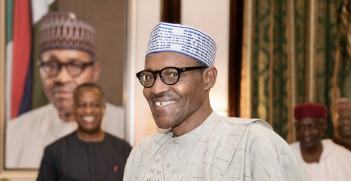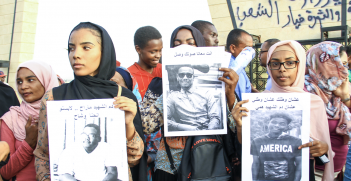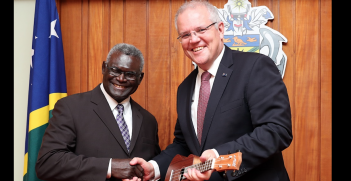Africa Without Aid: Another Empty Promise?

In the wake of recent calls for an “Africa beyond aid” by Ghana’s president Akufo Addo, it is important to restate an international relations reality: any ambitious international economic or political program requires genuine commitments to responsible governance at home.
At a Royal Africa Society event in London on 21 November 2017, Ghana’s President Nana Akufo Addo declared: “We shall move Africa beyond aid.” On 30 November, the president repeated this solemn commitment at a joint press conference with French president Emmanuel Macron in Accra. Akufo Addo surprised his French counterpart with a scathing diplomatic rebellion: “We have to get away from this mindset of dependence—this mindset about ‘What can France do for us?’” Africa does not “want to be pitied” and become “pawns or victims”, the president added.
The argument for more trade and less aid in Africa’s global economic outlook isn’t new. Dr Dambisa Moyo’s seminal work Dead Aid makes a cogent intellectual case for an Africa beyond aid. The problem is that words mean nothing without action. And action is ineffective without a genuine commitment to responsible governance and accountability to the governed. It appears that whilst the president is calling for an “Africa beyond aid” before the cameras and at grand events, his own government in Ghana seems to be playing by a different script.
Akufo Addo is rounding up his first year in office, but his government is already under pressure to answer for serious political and economic issues. For example, the president is seen to be okaying corruption. Despite promising to cut superfluous government spending, his government runs a buoyant and unprecedented government of 110 ministers. In the government’s last budget, GhC800,000.00 (AUD$250,000.00) was allocated for the construction of a government website, and GhC132,000.00 for the construction of a borehole.
A very lenient computation of those figures by the award-winning investigative journalist, Manasseh Azure Awuni, suggests that these funds could construct 400 new sophisticated websites and 18 boreholes respectively. When pressured, the government explained the GhC800,000.00 figure as a typo. An oversight which suspiciously survived the due diligence of the Finance Ministry.
Another concerning aspect of Akufo Addo’s first year, was that the appointment of 110 ministers was without a discernible strategy. The government is now replete with an unusually high number of members of the president’s family and those of his vice president. This make his government dangerously neopatrimonialist.
With a nepotistic government and irresponsible budgetary figures under his immediate watch, the president’s calls for Africa’s economic independence will likely remain a political act of frothy valiance without resolve. A potential political thought bubble.
States are fundamental units for analysing the contemporary international system, per a realist view at least. Because states are such important actors, it is difficult to expect political and economic legitimacy at regional and global levels without the same at the national level. Good governance and responsible leadership at the national level are a necessary conduit to global economic independence. Therefore, it is hard to imagine how African leaders can achieve genuine economic independence at the global level when they are running irresponsible and corrupt national governments.
African leaders have the tendency to be messianic on the international stage whilst they remain demonic at home. President Akufo Addo stated in the presence of French President Macron that it was “not right for a country like Ghana—60 years after independence—to still have its health and education budgets being financed on the basis of the generosity of European taxpayers.”
True. But if the resources of Ghanaians and the funds harnessed from Ghanaian taxpayers continue to be misappropriated and diverted to private pockets, it becomes an economic necessity for the Ghanaian budget to rely on European taxpayers. Fundamentally, this defies any call for a ‘Ghana beyond aid’ or an ‘Africa beyond aid’.
This tends to explain why most African countries struggle economically in the midst of abundance. Experts attest that, resource-wise, the now hungry Congo, for example, can feed much of the developing world beyond Africa. This paradox is not limited to the Congo. Countries such as Nigeria also possess enough natural resources to feed, finance and energise itself and export the excess to other countries. This is the case for many other African countries.
Accordingly, there is some agreement that African policymakers can turn a chronically depressed continent into an inspiring miracle of dazzling economic growth. What therefore leads to the resource curse in Africa is the corruption of leaders and mismanagement of national endowments.
This further leads to the recourse to foreign aid which kills African economies. Herman Chinery-Hesse, a Ghanaian software entrepreneur, stated that foreign aid “messes up our economy, it messes up our markets”. Aid begets economic laziness—the situation of African leaders and policymakers subverting their economic fortitude to the acceptance that “the aid will soon arrive so let’s wait”. The result of this is economic lethargy, and a reliance on foreign aid for national budgetary survival.
The idea of Africa beyond aid is therefore highly commendable. It should be the oxygen of a stable African economy. But African leaders seem to be fantasising about global economic independence without recognising the critical role of managing national resources responsibly.
It is true that African countries do not operate in a vacuum. The interests of powerful global actors compete with, and mostly subvert, those of African countries. Yet, countries such as Singapore and South Korea have competed within, and outmanoeuvred, the contemporary global structure with significant successes. To be able to achieve an Africa beyond aid, African leaders must see strong enough reason to protect their national and people’s interests—through robust and even aggressive but legitimate means if necessary—starting with a genuine commitment to responsible governance at home.
In Ghana’s case, perhaps one should not be too pessimistic about the commitment to an ‘Africa beyond aid’. Yet, although one year may be too early to lose hope in a four-year term government, the apparent disconnect between the Ghanaian government’s international posturing and its domestic deeds is disconcerting. If President Akufo Addo is conceding to corruption, economic mismanagement and irresponsible government this early in his government, what hope is there that he can successfully champion the African agenda on aid?
In the coming months and years, Africanist political observers will hope that the president’s utterances don’t remain exactly what they are—utterances. Therefore, it is important to remind President Akufo Addo that any ambitious international economic or political posturing requires genuine commitments to responsible governance at home.
Muhammad Dan Suleiman is a political analyst, and a PhD candidate at the University of Western Australia, Perth. His research interests include the international politics of Africa, peace and security in Africa, and Islamism, terrorism and counter-extremism in West Africa.
This article is published under a Creative Commons Licence and may be republished with attribution.





